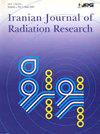预暴露于射频电磁场可增强鼠伤寒沙门氏菌和肺炎克雷伯菌感染后小鼠的免疫反应
Q4 Health Professions
引用次数: 1
摘要
背景:低水平的非电离辐射,如射频电磁场(RF-EMF)是否能诱导同样的阳性免疫反应,这个问题仍然没有答案。本研究旨在研究非电离RF-EMF对鼠伤寒沙门氏菌和肺炎克雷伯菌感染动物模型中免疫系统某些参数的影响。材料和方法:雄性BALB/c小鼠暴露于普通GSM手机产生的射频电磁场中3天。动物在第4天感染了肺炎克氏菌或鼠伤寒沙门氏菌。注射后第7天,通过心脏穿刺采集血样。用凝集法测定细菌特异性抗体,用ELISA法测定血清细胞因子水平。此外,使用细胞计数器测量白细胞计数。结果:与辐照小鼠相比,未辐照小鼠的细菌特异性抗体水平更高。在总血白细胞计数方面,辐照小鼠和未辐照小鼠之间没有显著差异。感染肺炎克雷伯菌后,小鼠血清IFN-γ和IL-17的平均水平显著升高(p<0.001)。结论:低水平的RF-EMF可刺激预暴露于RF-EMF的小鼠的免疫反应。这项研究提供了进一步的证据,支持暴露于一定水平的RF-EMF可以刺激免疫系统。这些适应性反应可以用于应对宇航员在深空任务中对感染的易感性增加。本文章由计算机程序翻译,如有差异,请以英文原文为准。
A pre-exposure to RF-EMF can enhance the immune responses of mice following Salmonella Typhimurium and Klebsiella pneumoniae infections
Background: The question of whether low levels of non-ionizing radiations such as the radiofrequency electromagnetic fields (RF-EMF) can induce the same positive immune responses remains unanswered. This study aimed to investigate the effects of non-ionizing RF-EMF on some parameters of the immune system in an animal model following infection with Salmonella Typhimurium and Klebsiella pneumoniae. Materials and Methods: Male BALB/c mice were exposed to RF-EMFs generated by a common GSM mobile phone for 3 days. Animals were infected with K. pneumonia or S. Typhimurium on the 4 day. On the7 day after injection, blood samples were collected by cardiac puncture. The specific antibodies against bacteria were determined by agglutination method and serum levels of the cytokines were measured using the ELISA method. Moreover, the leukocytes count was measured using a cell counter. Results: The levels of specific antibodies against bacteria were higher in non-irradiated mice compared to irradiated mice. There were no significant differences between the irradiated and non-irradiated mice regarding the total blood leukocyte count. The mean serum levels of IFN-γ and IL-17 after infection with K. pneumoniae were significantly higher in the irradiated mice (p<0.001). Conclusions: Low levels of RF-EMF can stimulate the immune responses in the mice pre-exposed to RF-EMF. This study provides further evidence supporting that exposure to certain levels of RF-EMF can stimulate the immune system. These adaptive responses may be applied to cope with the increased susceptibility of the astronauts to infections during a deep space mission.
求助全文
通过发布文献求助,成功后即可免费获取论文全文。
去求助
来源期刊

Iranian Journal of Radiation Research
RADIOLOGY, NUCLEAR MEDICINE & MEDICAL IMAGING-
CiteScore
0.67
自引率
0.00%
发文量
0
审稿时长
>12 weeks
期刊介绍:
Iranian Journal of Radiation Research (IJRR) publishes original scientific research and clinical investigations related to radiation oncology, radiation biology, and Medical and health physics. The clinical studies submitted for publication include experimental studies of combined modality treatment, especially chemoradiotherapy approaches, and relevant innovations in hyperthermia, brachytherapy, high LET irradiation, nuclear medicine, dosimetry, tumor imaging, radiation treatment planning, radiosensitizers, and radioprotectors. All manuscripts must pass stringent peer-review and only papers that are rated of high scientific quality are accepted.
 求助内容:
求助内容: 应助结果提醒方式:
应助结果提醒方式:


